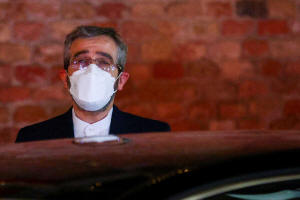Iran accuses Western powers of 'blame game' over 2015 deal
 Send a link to a friend
Send a link to a friend
 [December 14, 2021]
By Parisa Hafezi and John Irish [December 14, 2021]
By Parisa Hafezi and John Irish
VIENNA (Reuters) -Iran accused Western
parties to its 2015 nuclear deal on Tuesday of "persisting in their
blame game", a day after European diplomats warned the pact would soon
become defunct if efforts to revive it fail.
In a pessimistic assessment of talks between Iran and major powers in
Vienna, diplomats from Britain, France and Germany warned on Monday that
"time is running out" to rescue the pact, which they said would very
soon become "an empty shell" without progress in negotiations.
Iran's top nuclear negotiator, Ali Bagheri Kani, responded on Twitter by
saying: "Some actors persist in their blame game habit, instead of real
diplomacy. We proposed our ideas early, and worked constructively and
flexibly to narrow gaps."
Referring to the United States and its withdrawal from the nuclear pact
in 2018, Kani wrote: "Diplomacy is a two-way street. If there's real
will to remedy the culprit's wrongdoing, the way for a quick, good deal
will be paved."

However, U.S. Secretary of State Antony Blinken said on Tuesday that
Washington continues to pursue diplomacy with Iran because "it remains,
at this moment, the best option", but added that it was "actively
engaging with allies and partners on alternatives".
The stakes are high. Failure in the negotiations would carry the risk of
a new regional war, with Israel pushing for a tough policy if diplomacy
fails to rein in Iranís nuclear work.
Indirect talks between arch-foes Iran and the United States started in
April, but stopped in June after the election of hardline cleric Ebrahim
Raisi, whose negotiating team has returned to Vienna after five months
with an uncompromising stance.
In 2019, Iran started breaching nuclear restrictions under the pact in
response to the U.S. withdrawal and decision to reimpose harsh sanctions
which have devastated Iranís economy.
"Who violated the deal? Americans. Who should compensate for that and be
flexible? Americans of course," said a senior Iranian official.
Iran's clerical rulers believe that a tough approach, spearheaded by
their strongly anti-Western Supreme Leader Ayatollah Ali Khamenei, can
force Washington to accept Tehranís "maximalist demands", analysts and
diplomats said.
"But it could backfire. This is a very dangerous and sensitive issue.
Failure of diplomacy will have consequences for everyone," said a
diplomat in the Middle East on condition of anonymity.
SIGNIFICANT GAPS
During the seventh round of talks, which began on Nov. 29, Iran
abandoned any compromises it had made in the previous six, and demanded
more, a senior U.S. official has said.
[to top of second column]
|

Iran's chief nuclear negotiator Ali Bagheri Kani leaves after a
meeting of the Joint Comprehensive Plan of Action (JCPOA) in Vienna,
Austria, November 29, 2021. REUTERS/Lisi Niesner/File Photo

With significant gaps remaining between Iran and the United States
on some key issues - such as the speed and scope of lifting
sanctions and how and when Iran will reverse its nuclear steps -
chances of an agreement seem remote.
Iran insists on immediate removal of all sanctions in a verifiable
process. Washington has said it would remove curbs "inconsistent"
with the nuclear pact if Iran resumed compliance, implying it would
leave in place others such as those imposed under terrorism or human
rights measures.
Iran also seeks guarantees that "no U.S. administration" will renege
on the pact again. But Biden cannot promise this because the nuclear
deal is a non-binding political understanding, not a legally binding
treaty.
"How can we trust Americans again? What if they ditch the deal
again? Therefore the party that violated the deal should provide
guarantees that it will never happen again," said the Iranian
official.
"This is their problem not ours to solve ... They can find a
solution and give us guarantees."
Dramatically upping the ante, Iran has also limited access given to
U.N. nuclear watchdog inspectors under the nuclear deal, restricting
their visits to declared nuclear sites only.
Though essential to reinstate the nuclear pact, the International
Atomic Energy Agency (IAEA) said last month it had not had access to
re-install surveillance cameras at the TESA Karaj centrifuge-parts
workshop in Iran, which was hit by apparent sabotage in June in
which one of four cameras of the agency there was destroyed.

"Our talks with the IAEA about the Karaj complex still continue,"
Iran's top nuclear official Mohammad Eslami said, according to
Iranian media.
(Additional reporting by John Irish in Doha and Humeyra Pamuk in
Jakarta Writing by Parisa Hafezi; Editing by Lincoln Feast, Robert
Birsel and Raissa Kasolowsky)
[© 2021 Thomson Reuters. All rights
reserved.] Copyright 2021 Reuters. All rights reserved. This material may not be published,
broadcast, rewritten or redistributed.
Thompson Reuters is solely responsible for this content. |